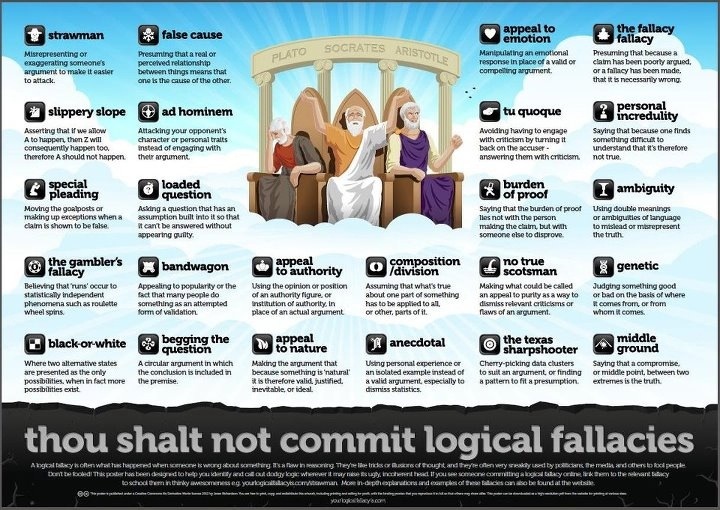The internet and social media have enabled people of differing viewpoints to talk past one another more now than at any other point in human history. As I have embarked on rants, arguments, and tête-à-têtes of various degrees of interestingness via Facebook, Twitter, Tumblr, and various blogs, I have learned far more than I ever wanted about the sorts of logical gymnastics that people, myself included, will undertake to reach or support their desired conclusion.
Now, someone has created a poster detailing the most egregious logical fallacies out there (h/t three Facebook friends):
My personal favorites, which I seem to encounter quite often, and of some of which I have no doubt been guilty myself, are:
- Tu quoque: This could be summarized as “I am not going to address your criticism of my position, because you (or someone aligned with you) has done the same thing! So there!” It has the effect of putting the other person on the defensive amd deflecting the original argument, all without actually arguing anything. It is a painfully weak, and fallacious, argument, because the implication is that the other person is similarly or equally culpable–thus assuming that the subject of the argument, whatever it may be, actually is wrong somehow. The correct response to this is something like “I recall how angry you were when my side did it, so you must be furious now that your side is engaging in this behavior as well.”
- Ad hominem: This one is very misunderstood. People seem to think that any attack on a person’s character, past behavior, or whatever is a fallacious ad hominem argument, but that’s wrong. It becomes fallacious when the personal attack is logically irrelevant to the argument. Compare “You are not an authority on ‘traditional family values’ because you are a serial adulterer three times divorced” to “Your opinion on this issue is irrelevant because you used to do drugs.”
- Slippery slope: “If we allow gays to get married, soon we will have to allow people to marry their dogs or their sofa!!!!1!1!!!!” This type or argument is popular among people who cannot tell the difference between a consenting adult human, a companion canine, and furniture. (Note that this type of argument is not always fallacious, but often serves to support some mind-numbingly dumb ideas.)
- No True Scotsman: Here, it is worth reciting the original text of the argument:
Scotsman A: You know, laddie, no Scotsman puts sugar in his porridge.
Scotsman B: Is that so? I seem to recall my cousin Angus (who is from Scotland) puts sugar in his porridge.
Scotsman A: Aye… but no true Scotsman puts sugar in his porridge.See, e.g., Bill O’Reilly’s stubborn refusal to accept that mass-murdering Norweigian Christian extremist Anders Breivik is a “true Christian.”
We now have an excellent set of real-world examples of some of these fallacies in action, relating to the news of Kentucky Senator Rand Paul’s endorsement of Mitt Romney for president, courtesy of the Libertarian Party (h/t Zandar):
When Dr. Rand Paul ran for U.S. Senate in Kentucky, many of his fund-raising appeals were sent to the donors and supporters of his father, Congressman Ron Paul. They were designed to convince Ron’s supporters that the apple doesn’t fall far from the tree. That Rand was, like his legendary father, a steadfast champion of liberty.
But no true libertarian, no true friend of liberty, and no true blue Tea Partier could possibly even consider, much less actually endorse or approve of, the Father of Obamacare, Big Government tax and spender, Republican Mitt Romney.
Especially the son of Ron Paul, who has no excuse.
Especially a medical doctor, who has even fewer excuses.
See if you can spot them all!
Here endeth the lesson. Now learn how to argue a point and stop wasting my time.


